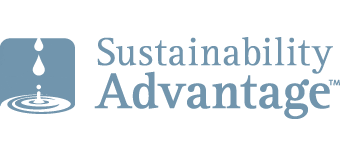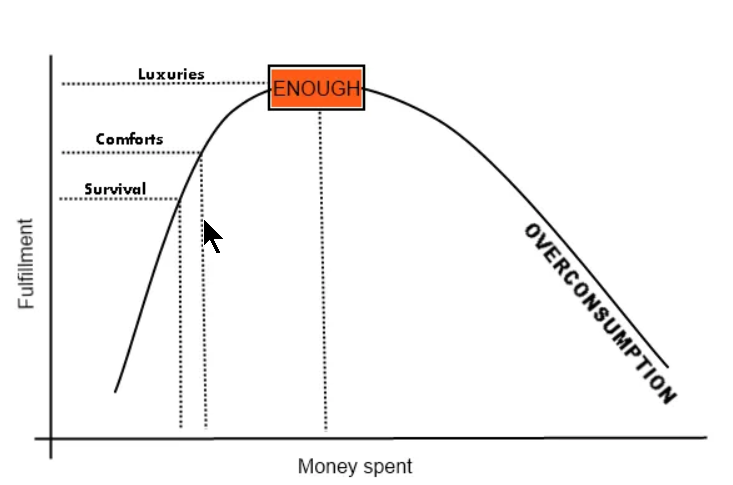Are Three Enoughs Enough? Part 1: Enough wealth
“Annual income twenty pounds, annual expenditure nineteen six, result happiness.
Annual income twenty pounds, annual expenditure twenty pounds ought and six, result misery.”
― Wilkins Micawber, clerk, in Charles Dickens’ David Copperfield
Lately, I’ve found myself revisiting the concept of “enough.” Maybe it’s time we all did. Maybe we would benefit from being satisfied with enough wealth, achieving enough sustainability, and making enough difference. I will explore these three “enoughs” in three blogs, starting with enough wealth.
Many years ago, I stumbled across a gem, Your Money or Your Life by Vicki Robin and Joe Dominquez. It introduced me to the liberating Fulfillment Curve, above. In the early part of the curve, we get sucked into thinking that wealth brings fulfillment because it does, as we work ourselves out of suffocating debt and inhale the fresh air of financial independence. We have enough income to meet our survival needs, education needs, our responsibilities, our comfortable lifestyles and occasional luxuries. When we reach the peak of the curve, we have enough time, income and wealth to be happy, comfortable and fulfilled. We have peace of mind.
However, following the more-is-better precept, we may decide to work harder and climb the career ladder so that we can acquire more wealth and luxuries. We expect that will lead to an even higher feeling of fulfillment and greater peace of mind. So we take on more responsibilities and their associated worry and stress. We may have less discretionary time for family, friends and ourselves. As the treadmill speeds up, we feel less fulfilled. The Fulfillment Curve dips. So does our life satisfaction and peace of mind. As Pip says in Dickens’ Great Expectations, as he runs up large debts with new found extravagances:
“We spent as much money as we could, and got as little for it as people could make up their minds to give us. We were always more or less miserable, and most of our acquaintances were in the same condition. There was a gay fiction among us that we were constantly enjoying ourselves, and a skeleton truth that we never did. To the best of my belief, our case was in the last aspect a rather common one.”
The thread-worn expression, “Money can’t buy happiness,” might be re-expressed as “Overconsumption can’t buy happiness,” especially if comes with an unhealthy side order of debt. As shown in the fulfillment curve, overconsumption is on the other side of enough.
Happiness is not about having more stuff, cheating on tax returns, or squirreling away obscene amounts of wealth. Fulfillment is a courageous, mature and self-confident decision. Enough wealth is a state of mind.
I remember speaking with a colleague several years ago about his experience bringing education to girls in remote African villages. By Western standards, the villagers were dirt poor. Literally. They lived in dirt-floor huts with no electricity or running water. What amazed him was how the children and adults were the happiest people he had ever met. They laughed, joked and enjoyed each other. They did not think of themselves as poor. They had enough to be fulfilled in their culture.
The trick, both personally and in business, is to find the “enough” sweet spot. As a sole proprietor, I have the luxury of creating a business model for myself that brings in enough revenue to support my synonymous business and personal purposes. Founder-led privately held companies can, too. Publicly-held companies are in a different situation. They are beholden to absentee owners (a.k.a. shareholders) who demand more revenue, more growth and more market share. Why? These achievements drive higher dividends and share prices. Taken to excess, enough starts to smell like selfish greed.
Unfortunately, we are trained to want more and not be satisfied with enough. A third Dickens quote may be all too true.
“The education of Mr. Jonas had been conducted from his cradle on the strictest principles of the main chance. The very first word he learnt to spell was ‘gain’ and the second (when he got into two syllables), ‘money’.”
― Charles Dickens, Martin Chuzzlewit
The concept of enough is seldom taught in business schools … unless it is enough to beat competitors, enough to do better than the previous quarter / year, enough growth, or enough to exceed analysts’ expectations. Unfortunately, this “more is enough” paradox leads to insatiable business models that require constant feeding with overconsumption. On a finite planet, overconsumption is unsustainable.
Which leads to the concept of enough sustainability, addressed next in Part 2. In the meantime, I wish you enough, personally and professionally.
Bob
Please feel free to add your comments and questions using the “Leave a reply” comment box under the “Share this entry” social media symbols, below. For email subscribers, please click here to visit my site and provide feedback.




Comments are closed.